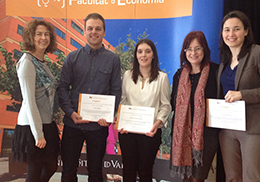
Graham White, alumno graduado del Máster Universitario en Gestión de Negocios Internacionales (iMBA) el curso pasado, ha ganado el premio anual que la Facultad de Economía de la Universitat de València concede a su mejor Trabajo Final de Máster.
Graham consiguió el premio por su investigación «Entrepreneurship Versus Non-Entrepreneurship Orientated Managers Entering Newly Liberalized Markets: The Case for U.S. Managers in Cuba» («Gestores Orientados al Emprendimiento Vs No Orientados al Emprendimiento en su Entrada a Mercados Recientemente Liberalizados: El Caso de Gestores de EE.UU. en Cuba»). Hizo los módulos de base del iMBA en la UNCW antes de seguir la especialización en Marketing Internacional en la UV.
Los candidatos tenían que 1) Haber realizado su tesis en la facultad durante el curso académico 2014/15, con matrícula (mínimo 9 sobre 10); 2) Crear un poster de 100x70cm detallando su trabajo de investigación para ser presentado y evaluado durante el Foro de Empleo y Emprendimiento 2016 (que se desarrolló el 17 y 18 de febrero).
El primero premio fue un iPad Air 16GB, además de una beca para asistir al XI Valencia Summer School on Business and Economics y un cheque de la empresa Consum (patrocinadores del premio).
La otra ganadora del premio fue Marina LLavador Ancheta (Máster en Política Económica y Economía Pública). Fueron finalistas Ilse Stefanía Lugo Cuan (Máster en Gestión de la Calidad) y Cristina Gaona García (Máster en Mercado e Investigación de Mercados).
Este es el abstract de la tesis de Graham:
Entering a newly liberalized market is a great challenge for companies as the environment is new and untested. In order to have success in these markets, firms must have a plan of action in place before resources are committed. What some companies do not realize is that their own entrepreneurship orientation (EO) will dictate their behavior, actions, and performance in both their home market and abroad. In order to maximize firm performance and realize success in newly liberalized markets (such as Cuba), firms must be able to objectively gauge their own entrepreneurship orientation. In this framework, the present paper will attempt to effectively measure the entrepreneurship orientation of U.S. firms that have an interest in entering the Cuban market. A final sample of 81 U.S. managers, with differing entrepreneurship orientation grades, was obtained. They were then split into two groups (high and low entrepreneurship orientation; 41 and 35 managers in each group, respectively) and compared regarding four variables: (i) entry mode, (ii) marketing strategy, (iii) government affiliation, and (iv) performance. Our results confirm that entrepreneurship orientation and firm performance do correlate positively. EO also has a positive relationship with marketing strategies that are implemented in new markets.
Keywords: Entrepreneurship orientation, innovativeness, proactiveness, risk-taking, newly liberalized market, entry mode, marketing strategy, government affiliation, and firm performance.







